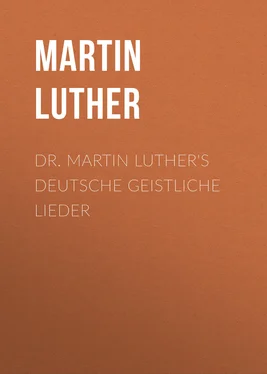Martin Luther - Dr. Martin Luther's Deutsche Geistliche Lieder
Здесь есть возможность читать онлайн «Martin Luther - Dr. Martin Luther's Deutsche Geistliche Lieder» — ознакомительный отрывок электронной книги совершенно бесплатно, а после прочтения отрывка купить полную версию. В некоторых случаях можно слушать аудио, скачать через торрент в формате fb2 и присутствует краткое содержание. Издательство: Иностранный паблик, Жанр: foreign_prose, foreign_religion, Философия, foreign_psychology, foreign_antique, на немецком языке. Описание произведения, (предисловие) а так же отзывы посетителей доступны на портале библиотеки ЛибКат.
- Название:Dr. Martin Luther's Deutsche Geistliche Lieder
- Автор:
- Издательство:Иностранный паблик
- Жанр:
- Год:неизвестен
- ISBN:нет данных
- Рейтинг книги:4 / 5. Голосов: 1
-
Избранное:Добавить в избранное
- Отзывы:
-
Ваша оценка:
- 80
- 1
- 2
- 3
- 4
- 5
Dr. Martin Luther's Deutsche Geistliche Lieder: краткое содержание, описание и аннотация
Предлагаем к чтению аннотацию, описание, краткое содержание или предисловие (зависит от того, что написал сам автор книги «Dr. Martin Luther's Deutsche Geistliche Lieder»). Если вы не нашли необходимую информацию о книге — напишите в комментариях, мы постараемся отыскать её.
Dr. Martin Luther's Deutsche Geistliche Lieder — читать онлайн ознакомительный отрывок
Ниже представлен текст книги, разбитый по страницам. Система сохранения места последней прочитанной страницы, позволяет с удобством читать онлайн бесплатно книгу «Dr. Martin Luther's Deutsche Geistliche Lieder», без необходимости каждый раз заново искать на чём Вы остановились. Поставьте закладку, и сможете в любой момент перейти на страницу, на которой закончили чтение.
Интервал:
Закладка:
It is just as in other matters they do greatly excel us, having splendid rites of worship, magnificent convents and abbeys; but the preachings and doctrines heard therein do for the most part serve the devil and dishonor God; who nevertheless is Lord and God over all the earth, and should have of everything the fairest, best and noblest. Likewise have they costly shrines of gold and silver, and images set with gems and jewels; but within are dead men's bones, as foul and corrupt as in any charnel-house. So also have they costly vestments, chasubles, palliums, copes, hoods, mitres, but what are they that be clothed therewithal? slow- bellies, evil wolves, godless swine, persecuting and dishonoring the word of God.Just in the same way have they much noble music, especially in the abbeys and parish churches, used to adorn most vile, idolatrous words. Wherefore we have undressed these idolatrous, lifeless, crazy words, stripping off the noble music, and putting it upon the living and holy word of God, wherewith to sing, praise and honor the same, that so the beautiful ornament of music, brought back to its right use, may serve its blessed Maker and his Christian people; so that he shall be praised and glorified, and that we by his holy word impressed upon the heart with sweet songs, be builded up and confirmed in the faith. Hereunto help us God the Father, Son and Holy Ghost. Amen.
Yet is it not our purpose that these precise notes be sung in all the churches. Let each church keep its own notes according to its book and use. For I myself do not listen with pleasure in cases where the notes to a hymn or a respon- sorium have been changed, and it is sung amongst us in a different way from what I have been used to from my youth. The main point is the correcting of the words, not of the music.
[Then follow selections of Scripture recommended as suitable for epitaphs.]
Luther's Third Preface
To the Hymn-book printed at Wittenberg by Joseph Klug, 1543. There are certain who, by their additions to our hymns, have clearly shown that they far excel me in this matter, and may well be called my masters. But some, on the other hand, have added little of value. And inasmuch as I see that there is no limit to this perpetual amending by every one indiscriminately according to his own liking, so that the earliest of our hymns are more perverted the more they are printed, I am fearful that it will fare with this little book as it has ever fared with good books, that through tampering by incompetent hands it may get to be so overlaid and spoiled that the good will be lost out of it, and nothing be kept in use but the worthless.
We see in the first chapter of St. Luke that in the beginning every one wanted to write a gospel, until among the multitude of gospels the true Gospel was well-nigh lost. So has it been with the works of St. Jerome and St. Augustine, and with many other books. In short, there will always be tares sown among the wheat.
In order as far as may be to avoid this evil, I have once more revised this book, and put our own hymns in order by themselves with name attached, which formerly I would not do for reputation's sake, but am now constrained to do by necessity, lest strange and unsuitable songs come to be sold under our name. After these, are arranged the others, such as we deem good and useful.
I beg and beseech all who prize God's pure word that henceforth without our knowledge and consent no further additions or alterations be made in this book of ours; and that when it is amended without our knowledge, it be fully understood to be not our book published at Wittenberg. Every man can for himself make his own hymn-book, and leave this of ours alone without additions; as we here beg, beseech and testify. For we like to keep our coin up to our own standard, debarring no man from making better for himself. Now let God's name alone be praised, and our name not sought. Amen.
Luther's Fourth Preface
To Valentine Bapst's Hymn-book, Leipzig, 1545. The xcvi Psalm saith: "Sing to the Lord a new song; sing to the Lord, all the earth." The service of God in the old dispensation, under the law of Moses, was hard and wearisome. Many and divers sacrifices had men to offer, of all that they possessed, both in house and in field, which the people, being idle and covetous, did grudgingly or for some temporal advantage; as the prophet Malachi saith, chap. i., "who is there even among you that would shut the doors for naught? neither do ye kindle fires on my altars for naught." But where there is such an idle and grudging heart there can be no singing, or at least no singing of any good. Cheerful and merry must we be in heart and mind, when we would sing. Therefore hath God suffered such idle and grudging service to perish, as he saith further: "I have no pleasure in you, saith the Lord of Hosts, neither will I accept an offering at your hand: for from the rising of the sun even to the going down of the same, my name shall be great among the Gentiles; and in every place incense shall be offered in my name and a pure offering; for my name shall be great among the heathen, saith the Lord of Hosts."
So that now in the New Testament there is a better service, whereof the psalm speaketh: "Sing to the Lord a new song; sing to the Lord all the earth." For God hath made our heart and mind joyful through his dear Son whom he hath given for us to redeem us from sin, death and the devil. Who earnestly believes this cannot but sing and speak thereof with joy and delight, that others also may hear and come. But whoso will not speak and sing thereof, it is a sign that he doth not believe it, and doth not belong to the cheerful New Testament but to the dull and joyless Old Testament.
Therefore it is well done on the part of the printers that they are diligent to print good hymns, and make them agreeable to the people with all sorts of embellishments, that they may be won to this joy in believing and gladly sing of it. And inasmuch as this edition of Valtin Bapst [Pope] is prepared in fine style, God grant that it may bring great hurt and damage to that Roman Bapst who by his accursed, intolerable and abominable ordinances has brought nothing into the world but wailing, mourning and misery. Amen. I must give notice that the song which is sung at funerals,
"Nun lasst uns den Leib begraben,"
which bears my name is not mine, and my name is henceforth not to stand with it. Not that I reject it, for I like it very much, and it was made by a good poet, Johannes Weis 8 8 Luther's mistake for Michael Weysse , author of a Moravian hymn-book of 1531.
by name, only a little visionary about the Sacrament; but I will not appropriate to myself another man's work. Also in the De Profundis , read thus:
Des muss dich fuerchten jedermann.
Either by mistake or of purpose this is printed in most books
Des muss sich fuerchten jedermann.
Ut timearis . The Hebrew reading is as in Matthew xv.: "In vain do they fear me teaching doctrines of men." See also Psalms xiv. and liii.: "They call not on the Lord; there feared they where no fear was." That is, they may have much show of humiliation and bowing and bending in worship where I will have no worship. Accordingly this is the meaning in the place: Since forgiveness of sins is nowhere else to be found but only with thee, so must they let go all idolatry, and come with a willing heart bowing and bending before thee, creeping up to the cross, and have thee alone in honor, and take refuge in thee, and serve thee, as living by thy grace and not by their own righteousness, etc.
A Preface to All Good Hymn-Books
From Joseph Klug's Hymn-Book, Wittenberg, 1543.
Of all the joys that are on earth
Is none more dear nor higher worth,
Than what in my sweet songs is found
And instruments of various sound.
Интервал:
Закладка:
Похожие книги на «Dr. Martin Luther's Deutsche Geistliche Lieder»
Представляем Вашему вниманию похожие книги на «Dr. Martin Luther's Deutsche Geistliche Lieder» списком для выбора. Мы отобрали схожую по названию и смыслу литературу в надежде предоставить читателям больше вариантов отыскать новые, интересные, ещё непрочитанные произведения.
Обсуждение, отзывы о книге «Dr. Martin Luther's Deutsche Geistliche Lieder» и просто собственные мнения читателей. Оставьте ваши комментарии, напишите, что Вы думаете о произведении, его смысле или главных героях. Укажите что конкретно понравилось, а что нет, и почему Вы так считаете.












